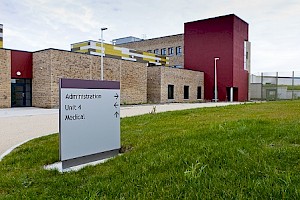Youth Justice
Ireland has a long history of poor responses to offending behaviour by children. A core strand to IPRT's work since its establishment in 1994 has been the promotion of a more effective youth justice system, with emphasis on non-custodial alternatives, diversion, early intervention and prevention strategies and programmes. Central to our work was ending the practice of detaining children in adult prisons, which was in breach of international human rights standards and a serious stain on Ireland's human rights record.
International human rights standards, and in particular the provisions of the UN Convention on the Rights of the Child, are clear that custody for children should only be used as a last resort and for the minimum required period of time. All efforts should be made to apply alternatives to detention to ensure that such a measure is only used in exceptional circumstances.
In Ireland, the Children Act 2001 recognizes the principle of detention as a last resort. The Act prohibits the imprisonment of children and the Criminal Justice Act 2006 makes provision for all children less than 18 years of age to be detained in Children Detention Schools. The detention school model is focused on a model of care, education, health and programmes that address offending, with improved outcomes for the young people, their communities and all of society. The Irish Youth Justice Service is responsible for the Children Detention Schools, within the Department of Children and Youth Affairs.
Following years of sustained advocacy by IPRT, along with many national and international bodies, in 2012 the detention of boys aged under 17 at St Patrick's Institution ended. In March 2017, a Ministerial Order ended the sentencing of children aged under 18 to adult prison in Ireland, and in April 2017, St. Patrick’s Institution was finally closed. Since September 2017 boys aged under 18 are no longer detained in the adult prison system.
IPRT continues to work towards progressive change in youth justice policies and practice, as well as engaging with wider policy and practice issues relating to youth justice, such as the provision of alternatives to detention, diversion and early intervention programmes.

Inspection reports on Children Detention Schools in Ireland (2011)
18th August 2011
The Health Information and Quality Authority (HIQA) carried out detailed follow up inspections of each of the children detention schools in 2011.
UK: Reductions in Child Imprisonment since 2008
13th July 2011
The Prison Reform Trust in the UK has published a report exploring the reductions in child imprisonment from 2008-2011. The number of children imprisoned in the period reduced by a third, from 3,000 to 2,000.
UK: Programme Reducing Gang Violence in Glasgow
5th July 2011
A co-ordinated programme between community, police and other groups in Glasgow has significantly reduced gang violence according to a new report released by the Violence Reduction Unity in the UK.
Scotland: Alternatives to Secure Care and Custody
30th June 2011
The Scottish Government published this Guidance for local authorities, community planning partnerships and service providers, for managing young people who offend (especially in relation to high risk and transitions).
UK: Resettlement provision for children and young people
21st June 2011
A new review from the Inspectorate of Prisons in the UK has found that in a small sample of young offenders, one in six will return to prison in the future.
UK: Prison Reform Trust report - 'Into the Breach'
12th May 2011
'Into the Breach', a new report released by the Prison Reform Trust summarises the findings of a project concerning children under the age of 18 who are in breach of their anti-social behaviour order or criminal justice order.
Report of the White Paper on Crime Consultation with Young People
29th April 2011
A new report published by the Department for Justice and Equality highlights young people's views on crime and how it can be dealt with.
US: Pathways to Desistance: A Longitudinal Study of Adolescent Offenders
1st April 2011
A new study published from the Office of Juvenile Justice and Delinquency Prevention in the US highlights that most young people desist from crime over time.
Inspection reports on Children Detention Schools in Ireland (2010)
25th March 2011
HIQA reports published on inspections carried out on the Children Detention Schools during 2010.
Irish Examiner: Plan to remove juveniles from St Pat’s
8th March 2011
Jennifer Hough reports that IPRT has welcomed the pledge to end the practice of sending children to St Patrick’s Institution included in the new Programme for Government.




